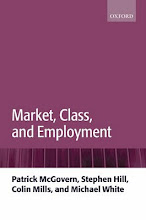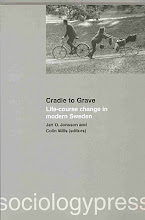My last post was a sideways observation on a little spat that is going on among the Bourdieusians. As I expected there is now a reply to the original comment. My reading of the whole thing is that Flemmen and Hjellbrekke wipe the floor with Atkinson and Deeming and that Atkinson's reply simply avoids the issues and throws in a few nasty ad hominem remarks to boot.
It's perhaps worth remembering that what they are arguing about, when it comes down to it, is little more than the correct way to interpret a few crosstabs. The fact that this is an issue at all tells you why an initiative like the UK's Q-Step is so important and why the paranoia in some quarters about the supposed dominance of quantitative methods in sociology research training is so completely bonkers. If we are still producing people who are shaky on crosstabs then we really are doomed.
I've nothing to contribute to the argument about which interpretation of Bourdieu on homologies is canonical; that's something for the fan-boys (and girls) to pursue. What I can do though is correct a few howlers that crept into the exchange.
Firstly, pace Atkinson, Benzécri did not invent correspondence analysis (I'd expect a diligent Bourdieusian to know that). Priority is generally ceded to H. O. Hirschfeld (1935) 'A connection between correlation and contingency' Proc. Camb. Philos. Soc. with notable contributions by Ronald Fisher (1940) 'The precision of discriminant functions' Ann. Eugen. and K. Maung (1941) 'Measurement of association in a contingency table with special reference to a pigmentation of hair and eye colours of Scottish school children' Ann. Eugen.
Secondly, and again pace Atkinson, it is simply not the case that multiple responses from the same individual 'may make CA an inappropriate method' (pp 195). There is no computational reason for this to be so and no formal inferential reason - typically inference of a formal kind is eschewed by CA practitioners so this can hardly be relevant. It may make a difference to how you interpret the numbers you get from the procedure, but that is another matter entirely.
All in all then, another lamentable so called debate that on closer examination turns out not to be a debate at all, but more of an unedifying squabble about whether the glass is half-full or half-empty. I'm off for lunch.










No comments:
Post a Comment